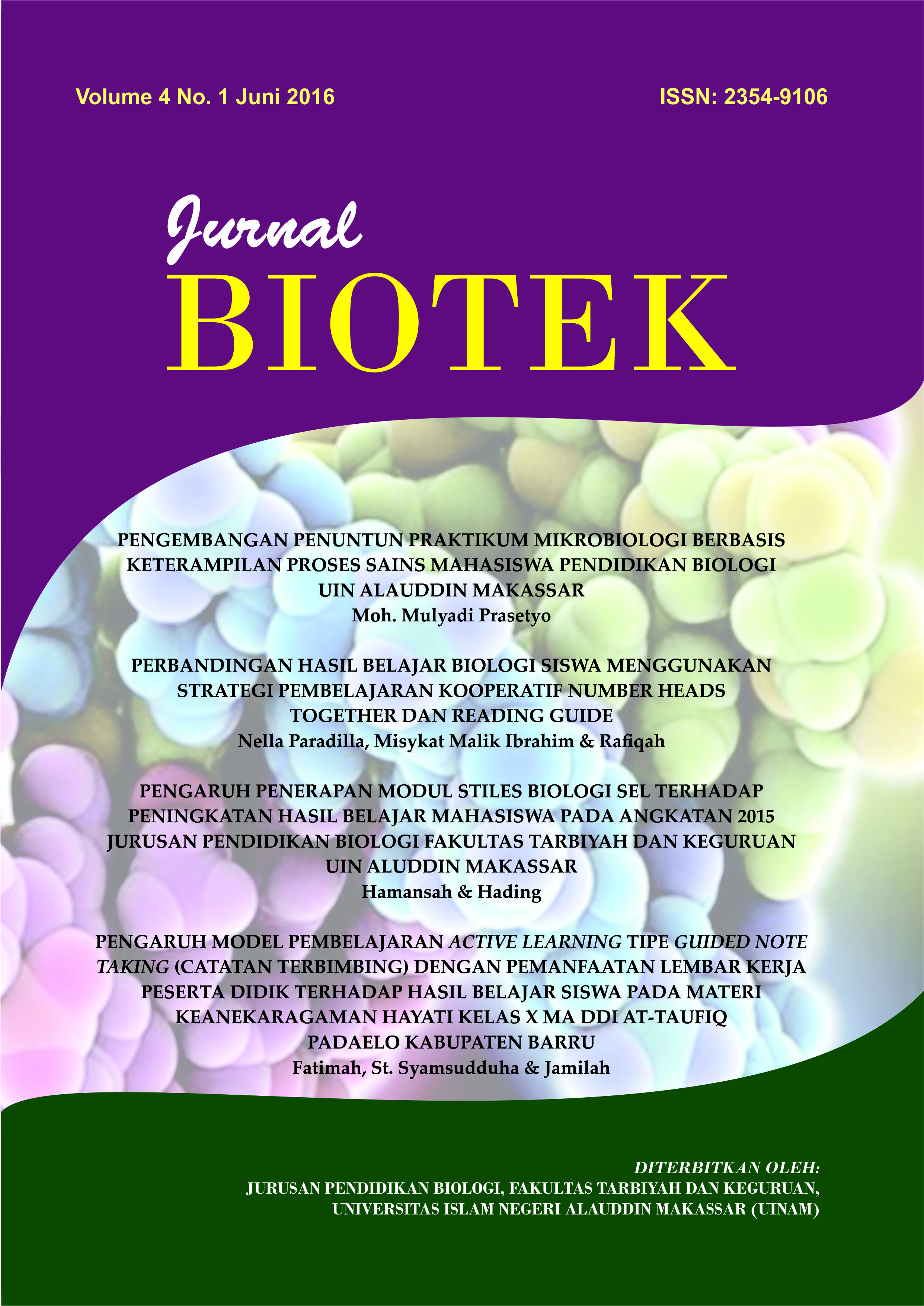PENGEMBANGAN INSTRUMEN PENILAIAN RANAH AFEKTIF PADA MATA PELAJARAN BIOLOGI DI SMA
Abstrak
This study aimed to produce the valid and reliable assessment instrument for affective domain in measuring the affective skill of high school students in the subjects of biology. Type of this research is the research development by using an Instrument Development method with twice trial and errors, 68 people on the first trial and 120 people in the second trial. In the first test successfully extracted two factors, the reliability coefficient that is indicated by an alpha internal consistency which equals to 0.865. The second trial also successfully extracted two factors, the alpha internal reliability coefficient obtained for 0.892. It can be concluded that the assessment instrument for affective domain developed has good construct validity and very high internal reliability coefficient.
##plugins.generic.usageStats.downloads##
Referensi
Arikunto, S. (2011). Dasar-Dasar Evaluasi Pendidikan (Edisi Revisi). Jakarta: Bumi Aksara.
Aryulina, Diah., Muslim, Choirul. Manaf, Syalfinaf. (2010). Biology 1B For Senior High School Grade X Semester 2. Jakarta: Esis
Aqib, Zainal dan Rohmanto. (2008). Membangun Profesionalisme Guru dan Pengawas Sekolah. Surabaya. Yrama Widya.
Badan Standar Nasional Pendidikan. (2008). Panduan Pengembangan Perangkat Penilaian Afektif. Jakarta: Direktorat Pembinaan SMA
Djaali. (2006). Psikologi Pendidkan. Jakarta: Bumi Aksara.
Gaguk, M. (2001). Pengembangan Instrumen Penelitian Pendidikan. Yogyakarta: Graha Ilmu.
Mardapi, D. (2008). Teknik Penyusunan Tes dan non Tes. Jakarta: Mitra Cendikia.
Nugroho, A.B. (2005). Strategi Jitu Memilih Metode Statistik Penelitian dengan SPSS. Yogyakarta. Penerbit Andi.
Rahmat Qomari. (2008). Pengembangan Instrumen Evaluasi Domain Afektif. Jurnal Pemikiran Alternatif Pendidikan, Insania Vol. 13 No. 1 Januari – April 2008. P3M STAIN Purwokerto.
Ruslan. (2009). Validitas Isi. Buletin Pa’biritta No 10 Tahun VI September 2009.
Ruslan. (2010). Penilaian Kinerja Dosen berdasarkan Kepuasan Mahasiswa dan Pengaruhnya terhadap Perilaku Pasca Kuliah. Jakarta: Pustaka Yaspindo.
Slameto, (2003). Belajar dan Faktor- fakror yang mempengaruhinya. Jakarta: Rineka Cipta.
Suryabrata, S. (2005). Pengembangan Alat Ukur Psikologi, Yogyakarta: Andi Offset.
Yusrizal. (2008). Pengujian Validitas Konstruk dengan Menggunakan Analisis Faktor. Jurnal Tabularasa Vol. 5 No. 1. Juni 2008. PPS Unimed.
Authors who publish with Jurnal Biotek agree to the following terms: Authors retain the copyright and grant Universitas Islam Negeri Alauddin Makassar right of first publication with the work simultaneously licensed under a Creative Commons Attribution License (CC BY-SA 4.0) that allows others to share (copy and redistribute the material in any medium or format) and adapt (remix, transform, and build upon the material) the work for any purpose, even commercially with an acknowledgement of the work's authorship and initial publication in Universitas Islam Negeri Alauddin Makassar. Authors are able to enter into separate, additional contractual arrangements for the non-exclusive distribution of the journal's published version of the work (e.g., post it to an institutional repository or publish it in a book), with an acknowledgement of its initial publication in Universitas Islam Negeri Alauddin Makassar. Authors are permitted and encouraged to post their work online (e.g., in institutional repositories or on their website) prior to and during the submission process, as it can lead to productive exchanges, as well as earlier and greater citation of published work (See The Effect of Open Access).

This work is licensed under a Creative Commons Attribution-ShareAlike 4.0 International License.



